In 2026, the world of Customer Relationship Management (CRM) continues to evolve — but one thing remains clear: businesses want freedom, transparency, and control over their data.
That’s why open source CRM software has become the go-to solution for small businesses, startups, and nonprofits alike. Unlike paid CRMs, open source tools offer customization, cost savings, and ownership, without vendor lock-in.
Whether you’re in the USA, UK, or anywhere worldwide, this guide explores the best open source CRM software for 2026, including free and self-hosted options ideal for growing companies.
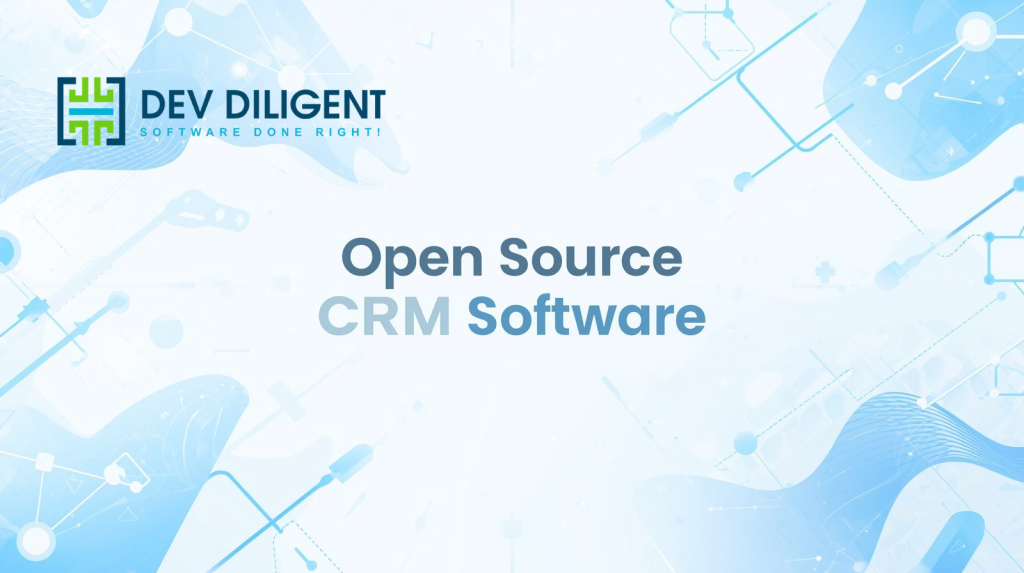
What Is Open Source CRM Software?
Open source CRM software is a type of CRM system whose source code is available for anyone to view, modify, and distribute. This gives businesses full control to:
-
- Customize workflows and features
-
- Integrate third-party tools
-
- Maintain complete data ownership
Unlike proprietary CRMs (like Salesforce or HubSpot), open source CRMs are often free or low-cost and allow on-premise hosting (self-hosted) for better privacy and compliance.
Why Choose Open Source CRM Software in 2026
In 2026, businesses are moving toward open and secure digital ecosystems. Here’s why open source CRMs stand out:
| Benefit | Description |
|---|---|
| Cost-Effective | Most open source CRMs are free to use and only require hosting costs. |
| Fully Customizable | Modify source code to match your workflow and branding. |
| Self-Hosted Option | Keep sensitive customer data within your own servers. |
| Scalable | Easily upgrade features as your business grows. |
| No Vendor Lock-In | You own your data and can move it anytime. |
Best Open Source CRM Software for 2026
Let’s explore the top-rated open source CRM tools that combine flexibility, security, and modern automation features.
1. SuiteCRM
SuiteCRM remains a leader in the open source CRM market for 2026.
It’s a feature-rich, enterprise-grade CRM that rivals paid platforms like Salesforce.
Key Features:
-
- – Sales, marketing, and support automation
-
- – Built-in reporting and dashboards
-
- – Integration with Outlook, Google, and APIs
-
- – Highly customizable with open codebase
Why It’s Best For:
Startups, agencies, and small businesses looking for an affordable Salesforce alternative.
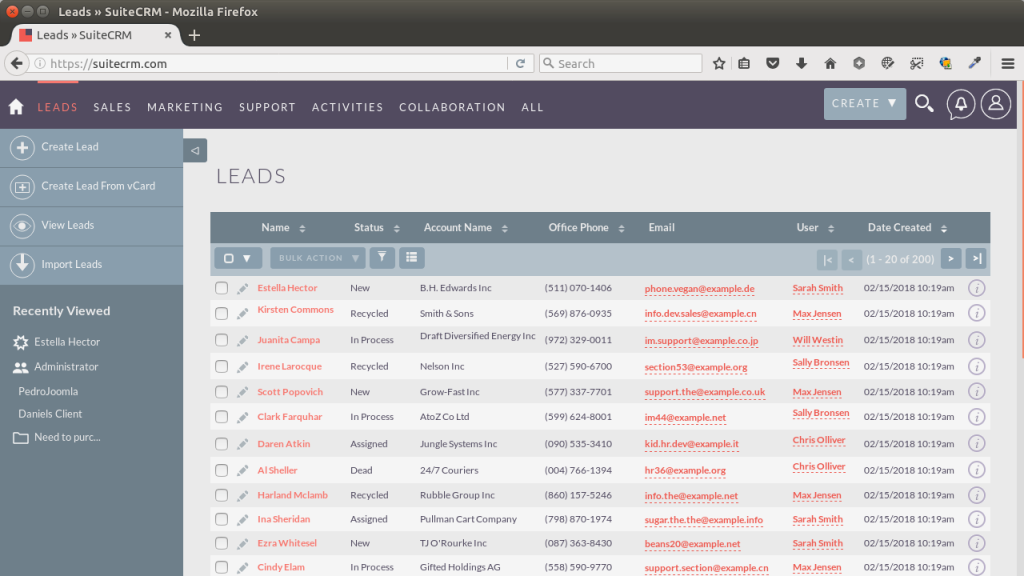
2. EspoCRM
EspoCRM is a lightweight yet powerful open source CRM tool that’s easy to install and use.
Key Features:
-
- Simple UI and fast performance
-
- Sales pipeline visualization
-
- Email integration and workflow automation
-
- REST API support for developers
Why It’s Best For:
Businesses that want a fast, clean, and self-hosted CRM solution.
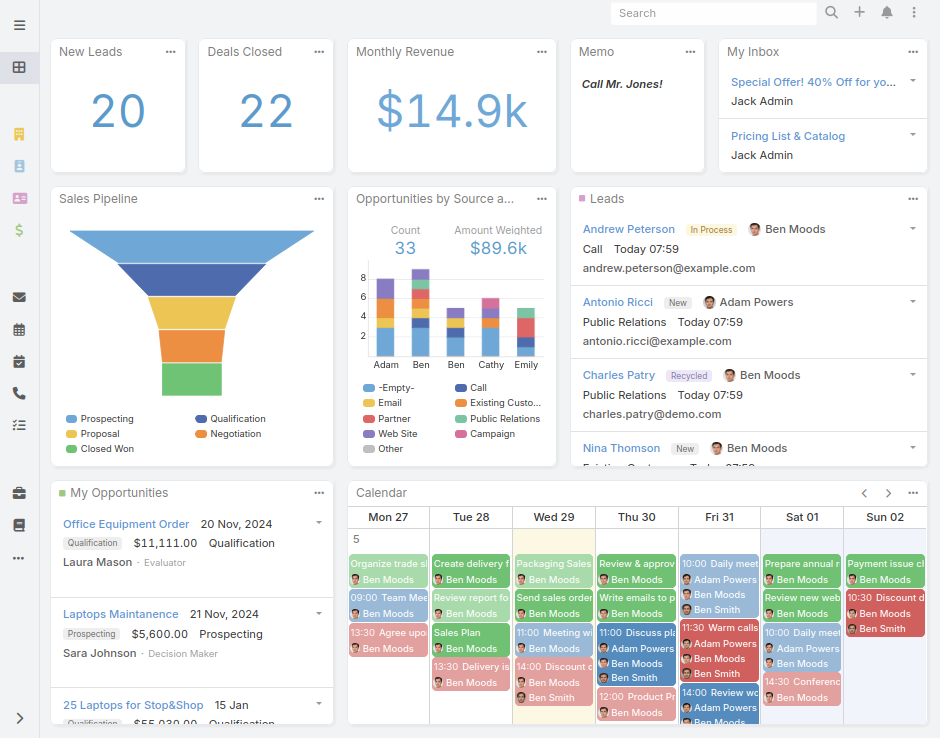
3. YetiForce
YetiForce continues to grow in popularity among small and mid-sized businesses.
Key Features:
-
- – Built on Vtiger core with advanced modules
-
- – GDPR-compliant and secure
-
- – Calendar, tasks, projects, and email integrations
Why It’s Best For:
Companies needing a data-secure, open source CRM for nonprofits or European-based organizations.
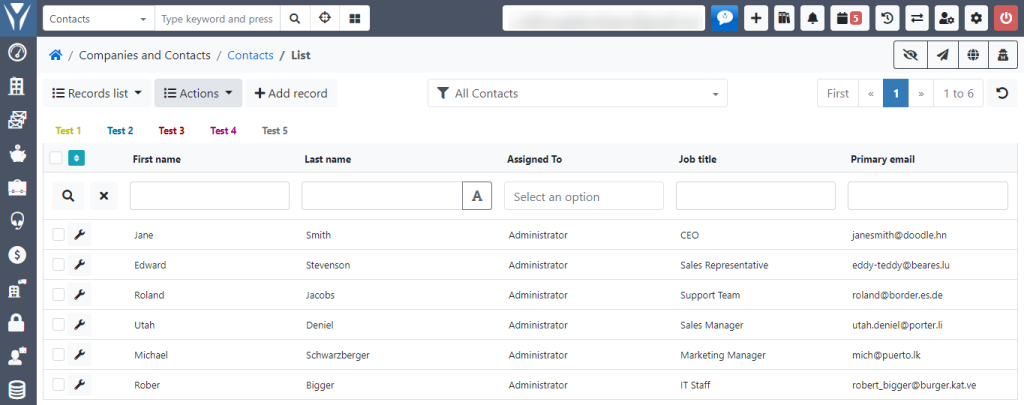
4. OroCRM
Created by the founders of Magento, OroCRM is a robust system for eCommerce and B2B businesses.
Key Features:
-
- – Multi-channel customer management
-
- – Deep eCommerce integrations
-
- – Advanced reporting and segmentation
Why It’s Best For:
Retailers and online stores that want open source CRM software with analytics.
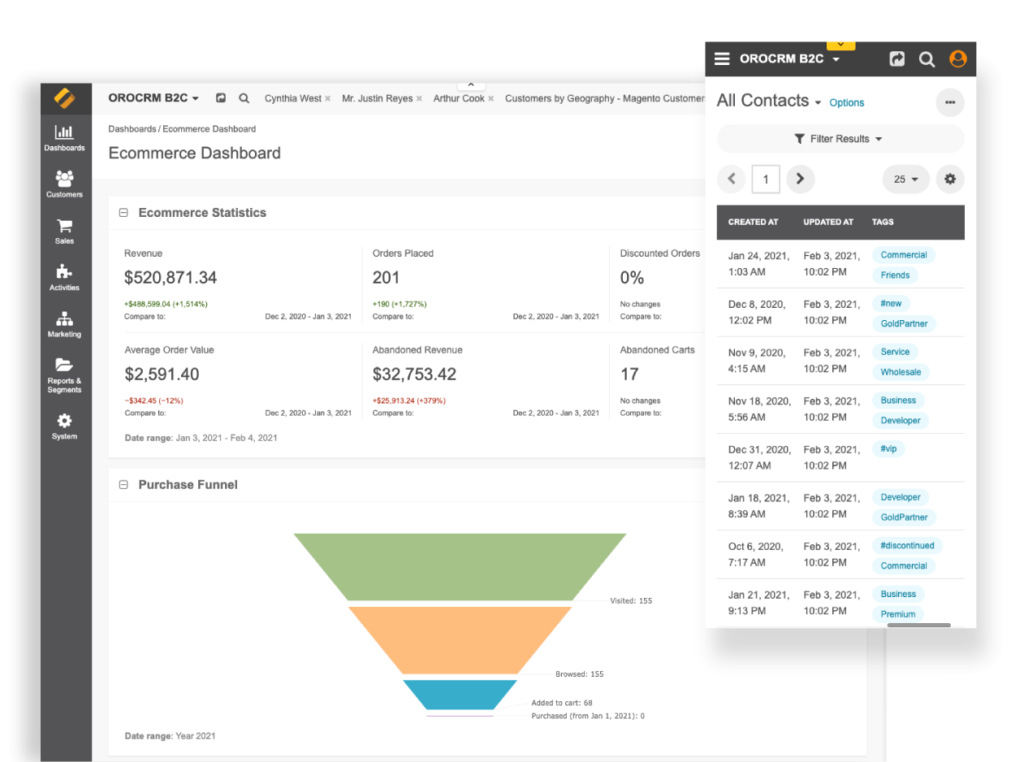
5. Vtiger CRM (Community Edition)
Vtiger’s open source edition remains a trusted name for businesses that prefer on-premise deployment.
Key Features:
-
- – Lead scoring and campaign management
-
- – Inventory and project modules
-
- – Integration with popular apps
Why It’s Best For:
Startups in the USA and SMEs looking for reliable open source CRM options for 2026.
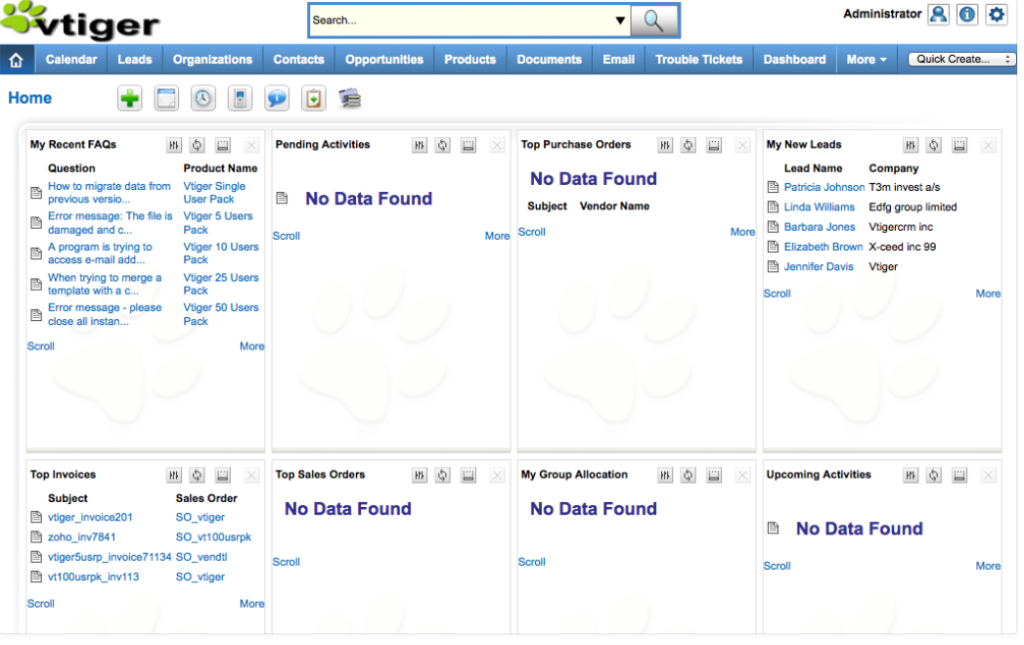
Free Open Source CRM Software for Small Business
For small businesses and startups, affordability is key. These CRMs are not only free but also provide enterprise-level functionality:
-
- – SuiteCRM – Completely free and highly extensible.
-
- – EspoCRM – Open source core with affordable add-ons.
-
- – YetiForce – Free, GDPR-compliant, and ideal for small teams.
-
- – Dolibarr CRM & ERP – Combines invoicing, CRM, and project management in one tool.
Why It Matters:
Free open source CRMs empower small business owners to scale operations without recurring costs or feature restrictions.
Open Source CRM Options for Startups USA 2026
In the USA, the CRM landscape is becoming more open and innovation-driven. Startups are increasingly opting for open source CRM tools to stay flexible and cost-efficient.
Top Open Source CRM Picks for USA Startups (2026):
-
- – SuiteCRM – Best all-in-one open source CRM for startups
-
- – EspoCRM – Lightweight and modern
-
- – Odoo CRM – Combines CRM + ERP features
-
- – YetiForce – Secure, compliance-ready CRM
Pro Tip:
Pair your open source CRM with cloud platforms like AWS or Google Cloud for scalability and performance.
Open Source CRM for Nonprofits and NGOs
Nonprofits and NGOs often need donor management, volunteer tracking, and fundraising features — without high licensing fees.
Top CRMs for Nonprofits:
-
- – CiviCRM – Built specifically for nonprofits
-
- – SuiteCRM (customized) – Perfect for donor tracking and reporting
-
- – Odoo CRM – Can integrate donation modules
Why Nonprofits Prefer Open Source:
It allows complete transparency, custom reporting, and control over sensitive donor data.
Open Source CRM Self-Hosted
Self-hosted CRMs are gaining traction among businesses that prioritize data privacy and custom control.
Advantages of Self-Hosting:
-
- – Full ownership of your CRM data
-
- – Customization without dependency on external vendors
-
- – Enhanced security compliance (HIPAA, GDPR)
Top Self-Hosted Open Source CRMs:
-
- – SuiteCRM (on-premise or private cloud)
-
- – EspoCRM (self-hosted edition)
-
- – YetiForce (free, with secure hosting options)
Open Source CRM vs. Paid CRM: Which Is Better for 2026?
| Feature | Open Source CRM | Paid CRM |
|---|---|---|
| Cost | Free or low-cost | Subscription-based |
| Customization | Full access to code | Limited to vendor options |
| Data Ownership | You own everything | Vendor controls storage |
| Support | Community-driven | Dedicated paid support |
| Scalability | Flexible with plugins | Built-in but expensive |
Verdict:
For startups, small businesses, and tech-savvy teams, open source CRM software offers the best balance of affordability, flexibility, and control in 2026.
Key Trends in Open Source CRM Software 2026
-
- – AI-Driven Insights: Predictive analytics for better decision-making.
-
- – Cloud + On-Premise Hybrids: Businesses mixing cloud convenience with self-hosted security.
-
- – Modular Customization: Add or remove features easily using open modules.
-
- – Integrations with Marketing Automation: Seamless sync with email, WhatsApp, and social platforms.
Conclusion
The future of CRM is open, flexible, and community-driven.
From small businesses and startups in the USA to nonprofits around the globe, open source CRM software is redefining customer relationship management in 2026.
Whether you’re looking for a free open source CRM, a self-hosted solution, or enterprise-level customization, tools like SuiteCRM, EspoCRM, and YetiForce stand as the best options for your business growth.
Vtiger Highlights the Strategic Value of Open Source CRM for Business Growth (2026 Update):
Recently, Vtiger reaffirmed the rising importance of open source CRM as a strategic asset for modern businesses. In their latest industry statement, Vtiger emphasized that open source CRMs empower organizations with unmatched flexibility, deep customization, and full control over customer data and workflows. However, they also highlight that making the most of open source solutions involves a thoughtful approach to ongoing updates, security management, and technical support—ensuring reliable long-term performance. As companies worldwide look to align their CRM systems with evolving strategies and growth goals, open source options like Vtiger, SuiteCRM, and others are recognized for their adaptability, transparency, and ability to scale with changing market demands. This trend underscores the need for businesses to balance custom development needs with diligent system management for a future-ready CRM strategy.
Latest Open Source CRM News and Updates (2026)
The open source CRM ecosystem continues to evolve in 2026, driven by innovation, AI integration, and better user experiences. Here’s a quick look at the latest open source CRM news and updates that are shaping the future of customer relationship management:
-
SuiteCRM 8.5 Update: This new release brings enhanced dashboards, advanced reporting, and better automation workflows. SuiteCRM’s open architecture still makes it a favorite among businesses that value customization.
-
Odoo 18 Release: Odoo’s latest version introduces improved CRM analytics, marketing automation, and multi-channel communication tools — making it an even stronger all-in-one business suite.
-
EspoCRM 8.0: The newest update focuses on collaboration, real-time notifications, and modern UI improvements, helping teams stay connected and productive.
-
Dolibarr CRM Enhancements: Dolibarr continues to refine its modular CRM with tighter ERP integration, faster performance, and updated security features.
These ongoing innovations highlight why open source CRM platforms remain a powerful alternative to SaaS-based CRMs. With constant community-driven updates, transparent code, and flexible deployment options, open source CRMs are keeping pace with global business demands in 2026.
FAQs About CRM Open Source Software:
1. What is the best open source CRM software in 2026?
SuiteCRM, EspoCRM, and YetiForce are the top open source CRM software options for 2026.
2. Which is the best open-source CRM?
SuiteCRM, Odoo, and ERPNext are among the best open-source CRMs for 2025.
3. What is the best CRM that is free?
HubSpot CRM, Zoho CRM, and Bitrix24 are top choices for the best free CRM software.
4. Is open source CRM software really free?
Yes — most are free to download and use, but you’ll need to cover hosting and maintenance costs.
5. What’s the best open source CRM for small businesses?
SuiteCRM and EspoCRM offer the best combination of features, cost, and simplicity.
6. Which open source CRM tools are self-hosted?
SuiteCRM, YetiForce, and EspoCRM offer full self-hosted deployments.
6. Which open source CRM tools are self-hosted?
SuiteCRM, YetiForce, and EspoCRM offer full self-hosted deployments.
7. Can nonprofits use open source CRM?
Yes — tools like CiviCRM and SuiteCRM are ideal for managing donors and campaigns.
8. How does open source CRM differ from paid CRM?
Open source CRMs offer code-level customization and freedom; paid CRMs charge for every user or feature.
9. What’s the most customizable open source CRM?
SuiteCRM is considered the most flexible and developer-friendly CRM in 2026.
10. Is open source CRM software secure?
Yes — with regular updates and self-hosted control, it’s often more secure than cloud-based vendors.
11. Can I use open source CRM in the USA or UK?
Absolutely. Most open source CRMs are global-ready and GDPR-compliant.
12. How do I choose the right open source CRM?
Identify your goals, budget, and team size — then test tools like SuiteCRM or EspoCRM before deployment.
13. Where can I find the latest open source CRM news and releases in 2026?
You can stay updated through our blog, where we regularly share insights on new versions and developments from leading open source CRM platforms such as SuiteCRM, Odoo, and Dolibarr. The open source CRM landscape is changing rapidly with new features, AI-powered tools, and performance upgrades released throughout the year.
14. Is there a free open source CRM?
Yes, most open source CRMs like Odoo (Community Edition), SuiteCRM, and Vtiger offer free versions that small businesses can start with.
15. Does Google have a CRM system?
No, Google does not have a CRM system, but it integrates with popular CRM platforms like HubSpot and Salesforce.
16. Is Odoo CRM really free?
Odoo CRM offers a free Community Edition. However, advanced features and modules may require paid plans.
17. Does Office 365 have a free CRM?
Office 365 does not provide a built-in free CRM, but it can integrate with third-party CRM systems.


